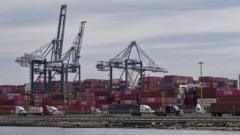Will Trump's New Order End Global Tariff Exemptions on Low-Cost Goods?

Understanding the Impact of Trump's Executive Order on Global Tariff Exemption
In a significant move that is set to reshape the landscape of international trade and consumer shopping, President Donald Trump signed an executive order that ends the de minimis exemption for low-cost goods coming into the United States. This order, effective from August 29, broadens previous actions that targeted only goods from China and Hong Kong, now applying to products from around the globe. The de minimis exemption had previously allowed items valued at $800 or less to enter the U.S. duty-free, which many American consumers relied on for affordable clothing, household items, and more from online platforms like Shein and Temu.
The White House has justified this decision, citing national security concerns and the need to prevent the influx of synthetic opioids. According to the administration, the exemption was being exploited to smuggle these dangerous substances into the country, with the claim that packages benefiting from the exemption were less likely to be examined thoroughly by customs officials. This article will delve deeper into the implications of this order, the rationale behind it, and what it means for consumers and businesses alike.
The De Minimis Exemption: A Brief Overview
The de minimis exemption has been a critical aspect of U.S. trade policy, allowing consumers to purchase low-cost items without incurring additional tariffs. This exemption was particularly beneficial for online shoppers who utilized international platforms to obtain goods at reduced prices. However, this exemption has long been a point of contention, especially with rising concerns about illegal activities and economic integrity.
Prior to the executive order, the exemption was primarily used for goods originating from China, which accounted for a significant portion of the shipments entering the U.S. However, Canada and Mexico also contributed to the influx of low-cost goods, benefiting from the same tariff-free privilege.
Reasons Behind the Executive Order
The Trump administration's decision to end the de minimis exemption stems from several key concerns:
- National Security: The White House claims that the exemption was being exploited to transport synthetic opioids into the U.S., contributing to the ongoing opioid crisis. By eliminating the exemption, the administration aims to strengthen border security and reduce the flow of these dangerous drugs.
- Economic Integrity: By broadening the scope of tariffs, the administration seeks to create a level playing field for American businesses, ensuring that all imported goods are subject to the same duties, regardless of their country of origin.
- Regulatory Compliance: The rule aims to combat fraudulent practices where shippers misreport the country of origin to evade tariffs. This adjustment is expected to enhance compliance with trade regulations.
What Changes Can Consumers Expect?
As this executive order takes effect, consumers will notice several changes when shopping for low-cost goods from international retailers:
- Increased Costs: Items valued at $800 or less will now incur tariffs, which will increase the overall cost of goods. For consumers who relied on the de minimis exemption, this could lead to significantly higher prices.
- Shopping Behavior: Consumers may need to reconsider their shopping habits, potentially seeking out domestic alternatives or adjusting their purchasing strategies to accommodate new tariffs.
- Impact on Retailers: Retailers who depend on international shipments may experience a decline in sales as consumers react to higher prices. This could lead to increased competition among domestic retailers who may benefit from the changes.
Congressional Actions and Future Implications
Prior to Trump's executive order, Congress had already been moving towards ending the de minimis exemption with the passing of the One Big Beautiful bill. However, the original timeline set by Congress was not scheduled to take effect until July 2027. By utilizing emergency presidential powers, Trump expedited the process significantly, citing the need to address national emergencies and protect American lives and businesses immediately.
This rapid change in policy raises questions about the effectiveness of congressional actions versus executive decisions. The administration’s approach may prompt future discussions in Congress about the balance of power regarding trade regulations and emergency measures.
Consumer Protection and Ongoing Challenges
While the intent behind the executive order is to enhance national security and protect American businesses, it is essential to consider the implications for individual consumers. The rule specifically does not affect personal items Americans carry with them from foreign travel valued at $200 or less, nor does it apply to gifts valued at $100 or less. However, the broader impact of increased tariffs on a wide range of goods could strain household budgets, particularly for low-income families who rely on affordable products.
Moreover, the enforcement of these new tariffs will pose challenges for customs officials, who will need to adjust their processes and protocols to accommodate the influx of goods now subject to duties. The potential for increased delays at ports and shipping facilities may further complicate the consumer experience.
Conclusion: A New Era in U.S. Trade Policy
The signing of this executive order marks a pivotal shift in U.S. trade policy, particularly regarding the treatment of low-cost imports. As consumers brace for increased prices and retailers navigate the changing landscape, it will be crucial to monitor the long-term effects of this decision on both the economy and consumer behavior. The balance between national security and consumer interests remains a delicate one, and how this executive order plays out in practice will likely shape future discussions on trade and tariffs.
FAQs
What is the de minimis exemption?
The de minimis exemption allows goods valued at $800 or less to enter the U.S. without incurring tariffs. It is designed to facilitate low-cost imports for consumers.
When will the new tariff rules take effect?
The new rules will come into force on August 29, 2023, significantly earlier than initially planned by Congress.
How will this affect online shopping from international retailers?
Consumers will face increased costs as low-cost goods will now incur tariffs, potentially changing their shopping habits and preferences.
What are the reasons behind ending the de minimis exemption?
The primary reasons include enhancing national security, promoting economic integrity, and combating fraudulent practices related to tariff evasion.
As we enter this new era of trade policy, what does this mean for your shopping habits? How will you navigate the changes in pricing and availability of goods? #TradePolicy #Tariffs #ConsumerRights
Published: 2025-07-30 22:07:06 | Category: wales



